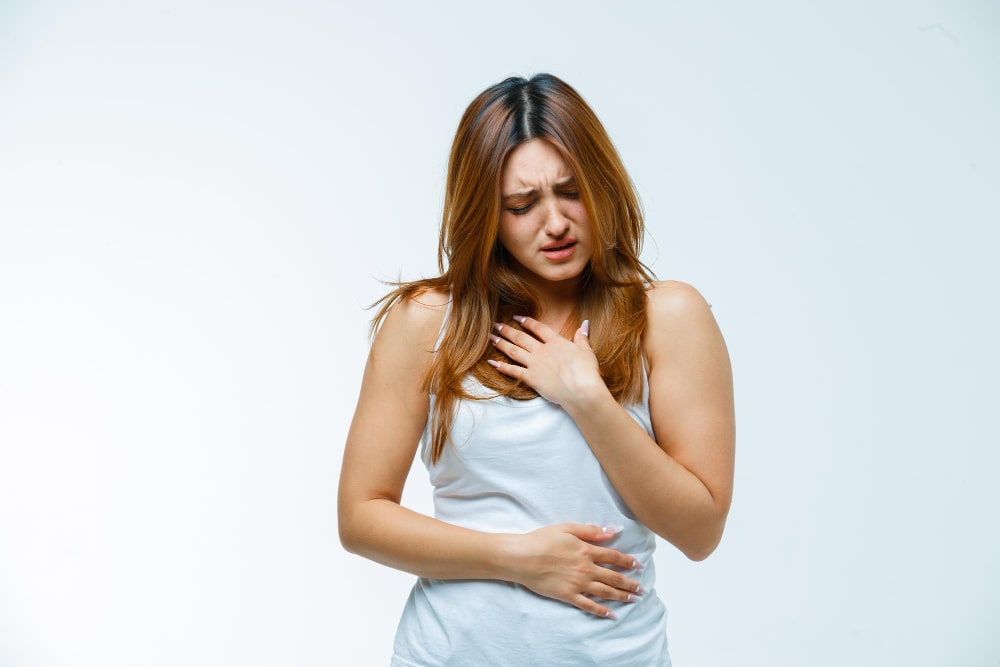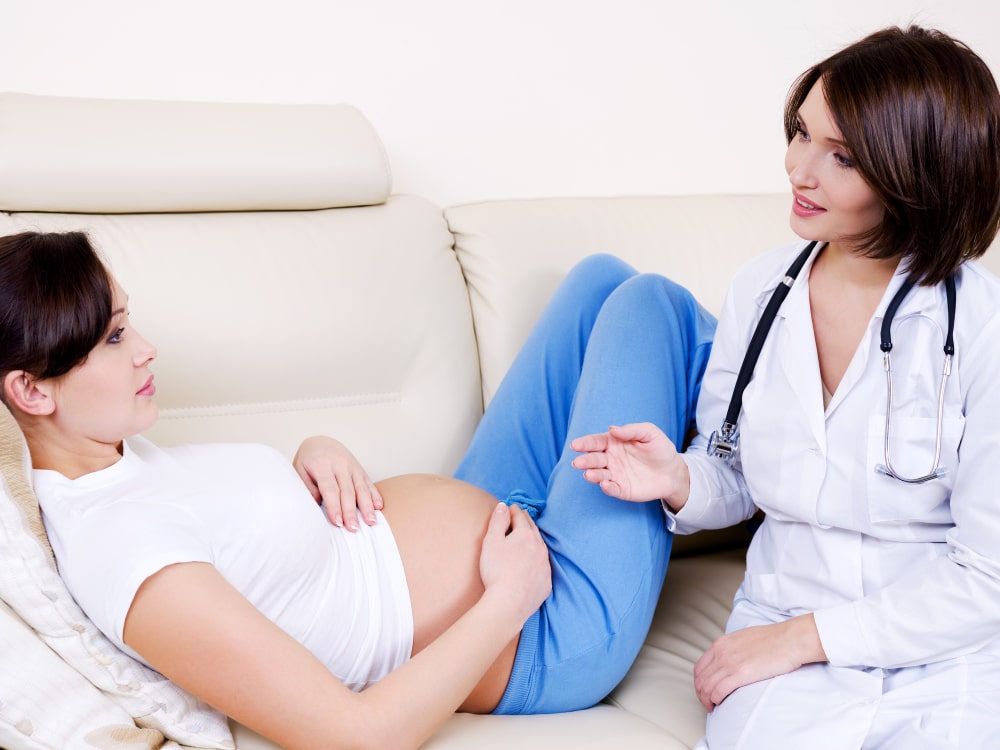If you’re pregnant and experiencing chest pain, you are likely concerned about the possible causes. There are several potential explanations for chest discomfort while pregnant, from relatively minor issues to more serious conditions requiring medical attention. This article will discuss various types of chest pain while pregnant, common causes, management at home when to contact a healthcare provider, medical evaluation and diagnosis, safety of medications, and tips to prevent chest pain.
Types of Chest Pain while Pregnant
There are several types of chest pain that you might experience while pregnant. Some may be normal physiological changes due to the pregnancy, while others can indicate a more serious medical condition requiring evaluation and treatment.
1) Normal Physiological Changes
Due to the physical and hormonal changes that occur during pregnancy, many pregnant women experience chest pains. Often, this is a harmless discomfort or tightness associated with your body expanding to accommodate your growing baby. This type of pain typically starts in the second trimester and should not be cause for concern.
Read More: Pain Inside Thigh: Causes, Treatment, and Prevention
2) Heartburn and Acid Reflux
Heartburn is a common discomfort experienced by many pregnant women and can also cause chest pain. It occurs when the stomach acid flows back up into your esophagus, irritating the lining of your digestive system. Symptoms include a burning sensation in the chest or throat, belching, sour taste in the mouth, and difficulty swallowing.

3) Musculoskeletal Pain
Chest pain during pregnancy can also be caused by muscular strain or injury due to the physical changes in the body. This type of chest pain is usually localized and may feel like a pulling sensation or sharp ache.
4) Anxiety and Stress
Anxiety and stress are common during pregnancy, but they can lead to chest tightness or pain when left untreated. It’s important to recognize and address any feelings of stress or worry, such as through relaxation techniques.
5) Serious Cardiovascular Issues
In some cases, chest pain during pregnancy can be a sign of a more serious cardiovascular issue, such as a heart attack or stroke. This type of chest pain is typically severe and will not go away with rest or home remedies. Seek medical attention immediately if you experience this type of chest pain.
Read More: Belly Button Pain During Pregnancy: Causes and Remedies
Common Causes of Chest Pain while Pregnant
There are many potential causes for chest pain while pregnant, ranging from physiological changes to more serious medical conditions that require medical attention.
Hormonal Changes and Heartburn
Hormone levels shift during pregnancy and can cause gastroesophageal reflux disease (GERD) or heartburn. This, in turn, can lead to chest pain and discomfort, as well as a burning sensation, belching, sour taste in the mouth, and difficulty swallowing.
Musculoskeletal Changes
Pregnant women may experience musculoskeletal chest pains due to physical changes, such as increased breast size and the growing uterus, which can strain and irritate muscles. This type of chest pain is usually localized and may feel like a pulling sensation or sharp ache.
Shortness of Breath
As your baby grows in the womb, it puts extra pressure on your lungs, making it harder for you to take deep breaths. This can result in chest pain or discomfort and shortness of breath.

Anxiety and Stress
Anxiety and stress can manifest in physical symptoms, such as chest tightness or pain. Stress management techniques can help reduce these symptoms.
Read More: Pain After Ejaculation: Causes, Symptoms, and Treatment
Serious Causes That Require Medical Attention
Although most chest pains while pregnant are not serious, some conditions may require medical attention.
1. Preeclampsia
Preeclampsia is a serious complication of pregnancy that can cause chest pain, along with other symptoms such as high blood pressure, swelling in the face or hands, nausea and vomiting, headaches, and visual disturbances.
2. Blood Clots
Deep vein thrombosis (DVT) is a condition in which blood clots form in the deep veins, usually in the legs. These clots can travel to the lungs and cause chest pain, shortness of breath, rapid breathing, and other symptoms.
3. Heart Conditions
In rare cases, pregnant women may experience chest pain due to an underlying heart condition that was previously unknown. If you experience chest pain that is severe and does not go away with rest or home remedies, call your healthcare provider right away.
Read More: Sigmoid Colon Pain: What Causes It, How to Relief Pain?
How to Relief Chest Pain at Home?
If the chest pain is mild and goes away after a few minutes of rest, it’s likely due to normal physiological changes or common discomforts associated with pregnancy. You can manage these symptoms at home with the following tips:
- Take a warm bath.
- Practice relaxation techniques or yoga poses to reduce stress and tension.
- Drink plenty of fluids throughout the day to stay hydrated.
- Eat smaller meals more frequently to avoid heartburn.
- Avoid tight clothing that can constrict your chest area.
- Take a short walk or get some fresh air.
When to See Your Healthcare Provider

If the chest pain is severe and does not go away with rest or home remedies, it’s important to contact your healthcare provider immediately. Other signs that you should seek medical attention include:
- Shortness of breath
- Rapid breathing
- Difficulty swallowing
- Pain in the arms or other areas of the body
- Dizziness or lightheadedness
Read More: Stomach Bug While Pregnant: Causes, Symptoms, Remedies
Medical Evaluation and Diagnosis
Physical Examination
Your healthcare provider will perform a physical examination to evaluate the cause of your chest pain. During the exam, they may check your blood pressure or listen to your heart and lungs with a stethoscope.
Diagnostic Tests
Your doctor can use imaging tests such as an ultrasound or X-ray to help diagnose the cause of your chest pain. Other tests, such as an electrocardiogram (ECG) or blood tests, may be ordered to rule out any underlying medical conditions.
Read More: Sharp Breast Pain: Causes, Symptoms, and Treatment Options
Treatment Options for Chest Pain Relief
The treatment options for chest pain while pregnant depend on the cause and severity of the symptoms. Your healthcare provider will develop a personalized plan for you that may include medications, lifestyle modifications, or other treatments.
Medications
Your doctor may prescribe medications to treat underlying conditions causing your chest pain, such as high blood pressure or a heart condition. They might also recommend over-the-counter antacids or H2 blockers for gastroesophageal reflux disease (GERD).
Read More: Pain in Knuckles: What Causes It, How to Relief Pain?
Lifestyle Modifications
Making small changes to your daily routine can help reduce chest pain and discomfort. This may include eating smaller, more frequent meals, avoiding tight clothing that can constrict the chest area, getting plenty of rest, and practicing relaxation techniques or yoga poses.
Other Treatments
Sometimes, your doctor may recommend physical therapy or other treatments to relieve chest pain. This may include exercises that can help strengthen your muscles and improve posture and techniques to reduce stress and worry, such as through deep breathing or guided imagery.
Safety of Medications During Pregnancy
It’s important to talk to your healthcare provider about medications, as not all are safe to take during pregnancy. Make sure to tell them about any other medications you’re taking, including over-the-counter drugs and supplements.
Medications to Avoid
Certain medications should be avoided during pregnancy, as they can harm your baby. These include non-steroidal anti-inflammatory drugs (NSAIDs), such as ibuprofen and aspirin, as well as certain heartburn medications and antibiotics. Make sure to talk to your doctor about the safety of any medications before taking them.
Read More: Ear Cartilage Pain: What Causes It, How to Treat It?
Prevention Tips
The best way to prevent chest pain while pregnant is to care for yourself and stay healthy. Here are some tips:
- Eat a balanced diet that is rich in fruits, vegetables, whole grains, and lean proteins.
- Exercise regularly with your doctor’s approval.
- Monitor your blood pressure at home and report any changes to your healthcare provider right away.
- Get plenty of rest and find ways to relax and reduce stress.
- Quit smoking if you do smoke.
- Wear comfortable, supportive shoes to relieve discomfort in your feet and back.
- Ask your healthcare provider for guidance on any medications or supplements you take during pregnancy.
Chest pain may be a sign of an underlying condition that requires medical attention. If you experience chest pain during pregnancy, talk to your healthcare provider right away for an evaluation and proper diagnosis. With the right treatment plan, you can manage your symptoms and ensure a healthy pregnancy for you and your baby.
Read More: Navicular Bone Pain: What Causes It, How to Relief Pain?
Exercise for Chest Pain Relief While Pregnant

Regular physical activity can help reduce chest pain while pregnant. Your healthcare provider should be able to recommend an exercise program that is safe and beneficial for pregnant women. Some types of exercises that may be recommended include:
- Swimming
- Walking or jogging
- Light weight training
- Low impact aerobics
- Yoga or Pilates
When exercising, it’s important to listen to your body and take breaks as needed. Wear comfortable clothing that doesn’t constrict the chest area, and stay hydrated throughout your workout. Make sure to talk to your doctor before starting any exercise program, especially if you have a history of heart or lung disease.
Conclusion
Chest pain while pregnant can be a frightening experience, but it is important to remember that it is usually not something to worry about. With the right treatment plan and lifestyle modifications, you can manage your symptoms and ensure a healthy pregnancy for both you and your baby. If you experience chest pain during pregnancy, talk to your healthcare provider right away for an evaluation and proper diagnosis. With the help of a healthcare professional, you can find relief from chest pain and experience a safe and healthy pregnancy.
Read More: Yeast Infection While on Period: What Causes It, How to Treat It?
FAQs
Tylenol is generally safe to take during pregnancy for short-term relief of pain, including chest pain. However, talking to your healthcare provider before taking any medication while pregnant is important. They will be able to recommend the safest and most effective treatment option for you.
Home remedies such as relaxation techniques or yoga poses can be beneficial for relieving chest pain during pregnancy. However, it is important to talk to your healthcare provider before trying any home treatment methods. They can recommend the safest and most effective options for you.
Chest pain can sometimes be a sign of labor, but it does not always indicate that labor is imminent. However, if you experience chest pain or other signs of preterm labor, it’s important to contact your healthcare provider immediately for advice and guidance.
Preeclampsia is a complication of pregnancy that can lead to chest pain. It is caused by increased blood pressure and protein in the urine, which can cause swelling in the chest and other organs. If you suspect preeclampsia, immediately talk to your healthcare provider for an evaluation and proper diagnosis.
Chest pain can sometimes be a sign of miscarriage, but it is not always an indication that a miscarriage is imminent. If you experience any concerning symptoms or signs, such as bleeding or abdominal pain, you must contact your healthcare provider immediately for advice and guidance.
Chest pain can sometimes indicate heart problems, such as coronary artery disease or cardiomyopathy. If you experience any concerning symptoms or signs, you must contact your healthcare provider immediately for an evaluation and proper diagnosis.

